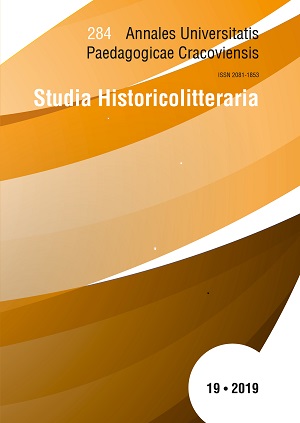The paradox of death and the Theatre of the Absurd
Main Article Content
Abstrakt
The aim of the article is the presentation of some interesting and stimulating questions connected with the problem of eschatological codes in the Theatre of the Absurd. The main objective of this paper is to discuss the topos of Death in the Theatre of the Absurd. Because the subject has been underexplored so far, the author tries to triangulate the Theatre of the Absurd within the genre of drama first, and then moves on to the short reflection on chosen plays of Beckett and Ionesco, concentrating on the role that eschatological elements, funereal objects and eschatons play in them. The starting point of this paper could be called “eschatology of the Absurd” or “immortality deconstructed”. Meaninglessness, as the value of absolute meaning, the meaning (Sinn) and significance (Bedeutung) of Death in the Theatre of the Absurd, is also discussed. As a method of research, he proposes a short “collective phenomenological analysis”. To analyse the issue from a broad perspective, the author takes into account the relationships between the writers and their times, and refers to cultural sources, specifically the Paradox of Death in the Theatre -particularly in the Theatre of the Absurd.
Downloads
Article Details

Utwór dostępny jest na licencji Creative Commons Uznanie autorstwa – Użycie niekomercyjne – Bez utworów zależnych 4.0 Międzynarodowe.
POLITYKA PRAW AUTORSKICH
Wydawca „Annales Universitatis Paedagogicae Cracoviensis. Studia Historicolitteraria” jest upoważniony do korzystania oraz do rozpowszechniana wszystkich opublikowanych w czasopiśmie materiałów na podstawie umowy licencji niewyłącznej, zawartej uprzednio na czas nieoznaczony każdorazowo z autorem/ką konkretnego utworu na określonych w tamtejszej umowie polach eksploatacji.
POLITYKA OTWARTEGO DOSTĘPU
„Annales Universitatis Paedagogicae Cracoviensis. Studia Historicolitteraria” to czasopismo o otwartym dostępie, a cała jego zawartość jest dostępna bezpłatnie dla użytkowników i instytucji na zasadach licencji niewyłącznej CreativeCommons (CC BY-NC-ND 4.0). Użytkownicy/ki mogą czytać, pobierać, wykonywać kopie, rozpowszechniać, drukować, wyszukiwać lub linkować do pełnych tekstów artykułów w tym czasopiśmie bez uprzedniej zgody wydawcy lub autora/ki pod warunkiem podania źródła dostępu i autorstwa danej publikacji. Jest to zgodne z definicją otwartego dostępu BOAI (http://www.soros.org/openaccess).
Bibliografia
Ankersmit F.R., History and tropology: the rise and fall of metaphor, University of California Press, Berkeley 1994.
Bauman Z., Śmierć i nieśmiertelność. O wielości i strategii życia (translation from the Polish edition by N. Leśniewski), Warszawa 1998 [oryg. Mortality, Immortality and Other Life Strategies – first published in 1992 by Polity Press in association with Blackwell Publishers].
Baudrillard J., La Transparence du mal: essai sur les phenomenes extremes, Galilee, Paris 1990.
Brater E., After the Absurd. Rethinking Realism and Few Other Isms, [in:] Around the Absurd. Essays on Modern and Postmodern Drama, Michigan 1990.
Camus A., Le Mythe de Sisyphe, Gallimard, Paris 1942. [Polish edition: Mit Syzyfa in A. Camus, translated into Polish by J. Guze, Warszawa 1991, p. 9].
Davies P., The Ideal Real, Beckett’s Fiction and Imagination, Fairleigh Dickinson University Press, London–Toronto 1995, p. 22.
Eliade M., Occultism, witchcraft, and cultural fashions. Essays in comparative religions, University of Chicago Press, Chicago 1976.
Esslin M., The Theatre of the Absurd, Eyre and Spottiswoode Press, London 1962.
Heidegger M., Sein und Zeit, Tübingen 1967.
Hodgson T., The Batsford Dictionary of Drama, Batsford, London 1988.
Klimczak D. P., Death and the Theatre of the Absurd. Thanatological motifs in the chosen plays of Samuel Beckett, Eugenio Ionesco and Sławomir Mrożek, dissertation defended on The Jagiellonian University (Uniwersytet Jagielloński) in Krakow (2004).
Klimczak D. P., Od patafizyki do metafizyki dramatu i Teatru Absurdu, „Colloquia Communia”. Idee i ludzie demokracji, ed. J. Mizińska, K. A. Król, Lublin 2003, no. I/(74), pp. 467–498.
Klimczak D. P., Medytacja nad Pustką. Konteksty buddyjskie w „Końcówce” i „Szczęśliwych dniach” Samuela Becketta, „Przestrzenie Teorii”, ed. A. Krajewska, Wyd. Nauk. Uniwersytetu im. Adama Mickiewicza, Poznań 2004, no. 3/4, pp. 337–371.
Kott J., Ionesco, or a Pregnant Death, [in:] The Dream and the Play. Ionesco’s Theatrical Quest, ed. M. Lazar, Undena Publications, Malibu 1982.
Krajewska A., Dramat i teatr absurdu w Polsce [The Theatre of the Absurd and Drama in Poland], Wyd. Nauk. Uniwersytetu im. Adama Mickiewicza, Poznań 1996.
Lane N., Understanding Eugéne Ionesco, University of South Carolina Press 1994.
Lyotard J. F., Peregrinations, Columbia University Press, New York 1988.
Maffesoli M., L’Ombre de Dionysos: contribution aune sociologie de l’orgie, Paris 1985.
Pleśniarowicz K., Teatr Śmierci Tadeusza Kantora [The Tadeusz Kantor’s Theatre of Death], Chotomów 1990.
Różanowski R., Absurd nasz powszedni, [in:] Absurd w filozofii i literaturze, ed. by the author, Wrocław 1998.
Tischner J., Filozofia dramatu. Wprowadzenie [The Philospophy of Drama. Introduction], Société D’Éditions Internationales, Paris 1990.
